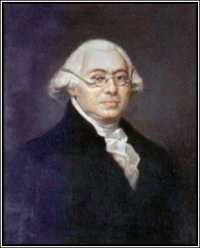 The name of James Wilson might not be very familiar, although this man was one of the people who made the difference in swaying the minds of the American colonists.
The name of James Wilson might not be very familiar, although this man was one of the people who made the difference in swaying the minds of the American colonists.
*** Quote ***
 The name of James Wilson might not be very familiar, although this man was one of the people who made the difference in swaying the minds of the American colonists.
The name of James Wilson might not be very familiar, although this man was one of the people who made the difference in swaying the minds of the American colonists.
James Wilson was born in Scotland on September the 14th, 1742. Here, he attended the Universities of St.Andrews, Glasgow, and Edinburgh. He never finished his studies, as he sailed for the New World in 1765. Aided by some letters of introduction, he became a tutor with the College of Philadelphia. He received an horonorary M.A. shortly thereafter. In November 1767, he was admitted to the bar, and thus pursuing his recent-born interest in the law. He set up his own practice in Reading in the year 1768. He was quite successfull, as he handled nearly half of the cases charged in the country court.
During one of the following years he married Rachel Bird.
In 1774, he wrote an essay with the title:" Considerations on the Nature and Extent of the Legislative Authority of the British Government." He distributed this article among the members of the First Continental Congress. Within those pages, he set down a number of arguments which severely challenged the parliamentary authority over America. In the final conclusion of this manuscript, he states that Parliament han no power whatsover over the American colonies. Although he accepted in some ways the power of the Monarch, he would not subject himself to the whims of Parliament, in which the colonies had no representation. His manuscript was read in both America and England, and created quite a stir. He was one of the first to ever voice these opinions in a sensible, well-argumented manner. To quote from the Declaration of Independence:"All the members of the British Empire are distinct states, independant of each other, but connected together under the same souvereign." The previous example is to illustrate the impact Wilson's statements made.
As a member of the Pennsylvanian Provincial Congress, he made a passionate speech about the possibility of an unconstitutional act made by Parliament. Judicial Review, the American system of checking governmental acts with the Constitution, was on it's way.
In the same year, 1775, he signed the Declaration of Independance as a member of the Second Continental Congress. According to sources, it seems he hesitated at first, but signed anyway. This was due to the fact that he was a representative of the Middle States, where opinions about independance differed. But by signing the Declaration, he broke the deadlock the Pennsylnanian delegation was in. His signature made sure Pennsylvania voted for independance.
During the next years he was an occasional member of the Continental Congress, and was present at the Constitutional Convention of 1787, which assembled with the purpose of drafting The Constitution of the United States of America. Here he was a very influential figure, whose ideas where heavily incorporated in one of the most important documents in history. Thus the Constitution bears his signature.
In 1789, he became a professor of law at the University of Pennsylvania, and in the same year was appointed associate justice of the Supreme Court. In this role, he did not shine as brightly as he used to do, as he did not voice any new or ground-breaking judicial ideas.
He deceased August 21, 1798; a widower with six children.
There is another biography of James Wilson, which differs on some topics